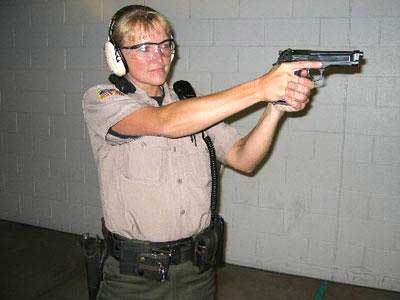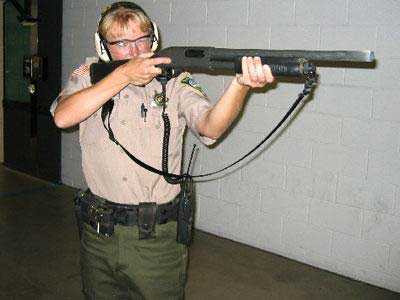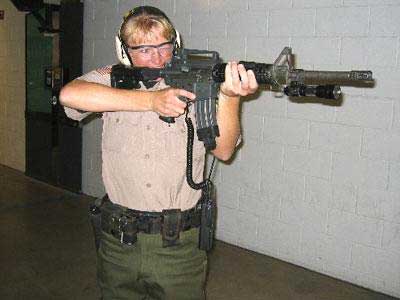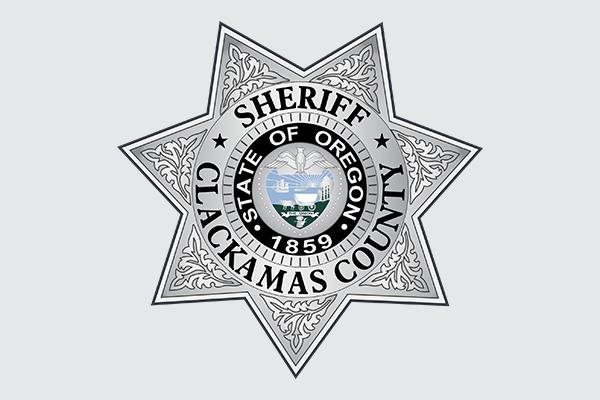The Firearms Training Unit (FTU) delivers proven, high-quality, and legally defensible training in marksmanship, gun handling, tactics, mindset, and the legal use of lethal force to the sworn members of the Sheriff's Office.
All training is designed to teach deputies to survive deadly-force encounters while simultaneously protecting the community and preserving citizens' civil rights.
Firearms Training Unit instruction is fully integrated with other skills areas of police work -- such as emergency vehicle operation, patrol tactics, and defensive tactics -- to give deputies all the force options and tools needed to successfully accomplish their assignments.
Training Safety
The Firearms Training Unit conducts training with a primary objective of making every deputy safe in their handling of weapons on the range, on the street, and in their own homes.
In developing courses of fire, each activity is analyzed for special safety considerations. A risk-benefit analysis is conducted to determine if training should be conducted, modified, or restructured. The ongoing in-service training conducted by the FTU for the instructors helps keep the training safety top notch, just as it keeps the instruction state of the art. FTU instructors are regularly called upon to serve as safety officers for other units such as SWAT, MEU, and Defensive Tactics.
One issue of firearms safety that the FTU recognizes and works to prevent is interlimb interaction. This can cause deputies under stressful conditions to unintentionally discharge their weapons. Interlimb interaction (also called sympathetic squeeze) is the involuntary contraction of an individual's hand and finger muscles. In law enforcement, we are very concerned with interlimb interaction as it relates to accidental discharges with firearms.
Deputies are issued a keypad activated safe for the secure storage of their sidearms. This is part of an effort by the Clackamas County Sheriff's Office to ensure that deputies and their families are safe in their home.
Instructors
The FTU is led by a sergeant and is staffed with deputies from Patrol and Corrections. One deputy is assigned to the PSTC as the full time firearms instructor. That deputy is responsible for training planning, scheduling, and range maintenance as well as instruction. Certification of instructors comes through the Oregon Department of Public Safety Standards and Training.
Nearly all of the instructors have attended both the NRA and the FBI's Firearms Instructor Courses. Additionally, the FTU has held in-service training from Insights Training, Yavapai Firearms Academy, Firearms Academy of Seattle, Jim Crews, and Stu Nakamura. Instructors have sought out additional training from Gunsite, Thunder Ranch, Heckler and Koch International Training Division, Ken Hackathorn, John Farnham, and Front Sight. This exposure to the top schools in the nation continues to ensure that the material being presented is of the finest quality and is grounded in most defensible theory.
Instructors on the FTU have been selected by a rigorous process and represent some of the most experienced members of the department. The most junior members of the unit have nearly 10 years of patrol experience. Several have extensive backgrounds in military operations and SWAT.
Equipment
 Deputies are responsible for purchasing their own firearms. Deputies may carry weapons in 9mm, .40 caliber, and .45 caliber from Colt, Sig Sauer, Heckler and Koch, Smith and Wesson, Glock, and Ruger. Additionally, deputies are permitted to carry M1911's from Wilson, Les Baer, SVT, and similar manufacterers.
Deputies are responsible for purchasing their own firearms. Deputies may carry weapons in 9mm, .40 caliber, and .45 caliber from Colt, Sig Sauer, Heckler and Koch, Smith and Wesson, Glock, and Ruger. Additionally, deputies are permitted to carry M1911's from Wilson, Les Baer, SVT, and similar manufacterers.
 Deputies are issued the Remington 870 shotgun as their shoulder weapon.
Deputies are issued the Remington 870 shotgun as their shoulder weapon.
 Deputies are permitted to purchase their own .223 AR-15 patrol rifle for carry. Deputies are permitted to purchase AR-15's made by Colt, Armalite, Olympic Arms, and Bushmaster. Those deputies receive specialized training in the employment of that weapon prior to deploying the weapon and then receive additional ongoing training for the AR-15.
Deputies are permitted to purchase their own .223 AR-15 patrol rifle for carry. Deputies are permitted to purchase AR-15's made by Colt, Armalite, Olympic Arms, and Bushmaster. Those deputies receive specialized training in the employment of that weapon prior to deploying the weapon and then receive additional ongoing training for the AR-15.
Some deputies are armed with the Pepperball Non Lethal system. Pepperball systems fire high speed "paintball" type projectiles that are filled with oleoresin capsicum powder. Propulsion of the rounds comes from high pressure gas. Specialized projectiles are carried for some situations like a glass breaking round and a water-filled impact round.
 Translate
Translate






